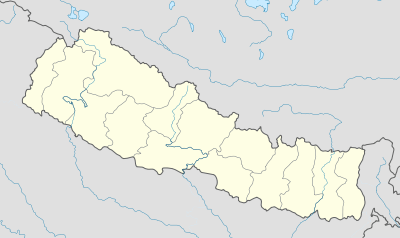Mahendranagar, Kosi
| Mahendranagar महेन्द्रनगर गाविस | |
|---|---|
| Village development committee | |
| Nickname(s): Chakraghatti | |
 Mahendranagar Location in Nepal | |
| Coordinates: 26°44′N 87°07′E / 26.74°N 87.11°ECoordinates: 26°44′N 87°07′E / 26.74°N 87.11°E | |
| Country |
|
| Zone | Kosi Zone |
| District | Sunsari District |
| Population (2011) | |
| • Total | 23,631 |
| Time zone | Nepal Time (UTC+5:45) |
| postal code | 56716 |
| Area code(s) | 025 |
Mahendranagar (महेन्द्रनगर) is a village development committee in Sunsari District in the Kosi Zone of south-eastern Nepal. Situated nearby the Koshi River the village is a developing rapidly and is soon to be a municipality. Most of the residents, as is common in Nepal, depend on agriculture but in the last few years the trend of going to the gulf countries as workers is increasing. The village is yet to have any prominent business house but is a growing market with a number of small industries, hotels and shops. Being linked with some major towns of the Sunsari District, this village holds a very good chance of development. There are number of schools and a higher secondary school in the village and almost all the children go to primary school. But the fraction of students continuing their studies to higher level is somehow not too great because of the low economic status of the people.
Most of the residents are Hindu but there is also a small area of Islam people in the village. The village is rich in temples and there is also a mosque and a church.
At the time of the 2011 Nepal census it had a population of 23,631 people living in 5431 individual households.[1]
Climate
The weather in Biratnagar is mostly hot. Biratnagar experiences 6 seasons,
| Season | Span (Nepali calendar) | Span (Georgian calendar) | Characteristics |
|---|---|---|---|
| Basanta (Spring) | Chaitra-Baisakh | March–April | Around 25-30 degrees Celsius, very dry and windy |
| Grishma (Summer) | Jestha-Ashad | May–June | Very hot, Up to 40 degrees Celsius, farmers prepare for rice planting |
| Barsha (Monsoon) | Shrawn-Bhadra | July–August | Hot, very humid and heavy monsoon rains, Krishna Janma Asthami (Birth of Lord Krishna) celebrations |
| Sharad (Autumn) | Ashvin-Kartik | September–October | Calm temperatures, festival season of Dashain and Tihar |
| Hemanta (Pre winter) | Mangshir-Pausha | November–December | Cold temperatures and sometimes fog (20-10 degrees Celsius), farmers harvest the rice |
| Sishir (Winter) | Magh-Falgun | January–February | cold temperatures and foggy weather. |
References
- ↑ "Nepal Census 2011". Nepal's Village Development Committees. Digital Himalaya. Retrieved 2 December 2008.
